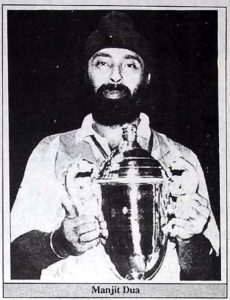
When Manjit Singh Dua won his first national men’s singles’ title in 1973, little did he realize that he would one day play the Nationals against a baby who was born the same year. Arup Basak, the top Seed in the men’s singles for the forthcoming 54th National Table Tennis Championships, to be held in Panaji (Goa), from April 26 to May3, will have the dubious honor of playing there against Dua. The Goa championships will be Dua’s 26th nationals without a break. Perhaps no other individual had ‘Participated in so many successive nationals in any other discipline in the country.
An outstanding player with a consistently high level of performance, left handed Dua has seen two generations come up at the national level in the past 26 years. Dua, who turns 39 this year, has an “Outstanding record in the nation also, having won the men’s singles ‘title thrice, the men’s doubles crown five times, bagged three mixed doubles titles and won the men’s team event thrice. He began ‘participating in the nationals at the age of 13, his first appearance being in the 30th edition in 1967 at Guwahati.
Even though he participated in six world and five Asian championships, and worked as a national coach for the Common; wealth and world championships and the Barcelona Olympics, Dua is still reluctant to call it a day, He believes he can still clinch some more victories in the national circuit
“I took to the game at a very tender age when I was in Khalsa School, Dey Nagar. I used to practice on a cranky table with either books or bricks as net,” re calls Dua. “My brother Rajinder, a regular participant in state championships, was a also south paw. I used to accompany him to various tournaments,” he adds. Manjit made his debut in the Delhi Championships in mid’60s and claimed his maiden title Junior Boys’ in 1968, a year after he had represented the state in the nationals. He retained the title for the next two years.
“My great moment came when I won the men’s doubles in 1970, with my brother as my partner,” he says with pride. The year 1974 saw Manjit Dua claim his maiden Delhi State men’s singles title. “But I won my first national men’s singles crown the earlier year in Madras, beating Jagannath. Al though I went on to annex several national tides, this one has a special place in my career. With this, I became the country’s No.1 player,” he says. He has won the State title so often that he has almost lost count.
An officer in the State Bank of India, Dua has also been a regular member of the Delhi squad at the nationals, except for a brief period between 1975 and 77, when he represented the Railways and was part of the victorious team in two successive nationals. He led Delhi to victory in three men’s team events in 1974, 1982 and 1980, Dua was given the Arjuna Award in 1982, and was a regular member of the Indian team for the world championships from 1973 (Sarajevo) to 1983 (Tokyo). In the fifth Commonwealth Champion ships in Scotland in mid80s, he won a bronze medal for India.
But his most memorable international match was the one in the 1982 Asian Games in Delhi. “I almost brought off a sensational victory over Cai Zhenhua of China, the (two-time world singles runner up, in the team championships. I was 1610 ahead in the decider but let him off the hook,” he says.
The veteran offers many suggestions for the improvement of the game. “India held the best position in the world after the 1985 Gothenburg World Champion ships where our men finished a very creditable 12th out of 66 nations. But we have lost the race since then. Two things need to be done one, give the right kind of training and, two, ensure maxi mum exposure to players through tournaments,”
Like the true sportsman that he is, Dua can think of no other life that he would rather have lived.
“If I were to live my life all over again,” he says, “I would still like to be a table tennis player, There is so much charm and adventure in the game. It has helped me to keep myself physically fit. I enjoy sharing with youngsters the experiences I had.”
Article extracted from this publication >> May 14, 1993